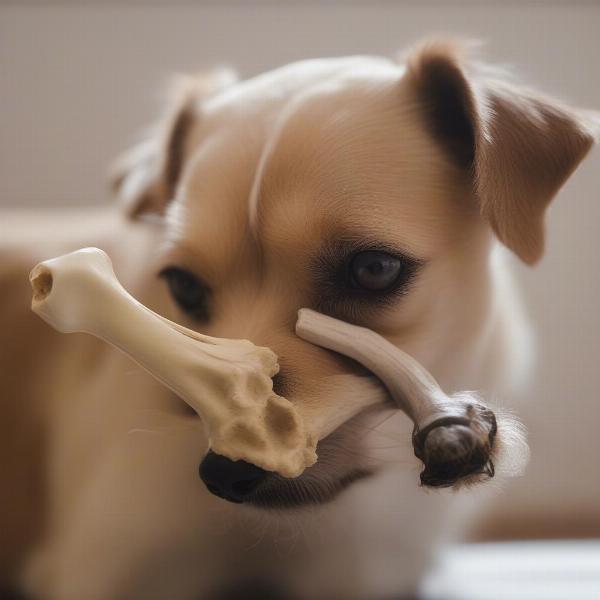Choosing the right chew bones for your small dog can be a daunting task. With so many options available, it’s important to understand what makes a good chew bone for your petite pup. This guide will cover everything you need to know about small dog chew bones, from safety and benefits to different types and how to choose the perfect one. We’ll also discuss how to keep chewing enjoyable and safe for your furry friend.
Why Chew Bones are Important for Small Dogs
Chewing is a natural instinct for dogs, especially small breeds. It helps them relieve stress, boredom, and even teething discomfort. Providing appropriate chew bones helps satisfy this natural urge and offers numerous benefits, including:
- Dental Health: Chewing helps scrape away plaque and tartar buildup, promoting good oral hygiene and preventing bad breath.
- Mental Stimulation: Chew bones offer a healthy outlet for mental energy, preventing destructive behaviors like chewing on furniture.
- Jaw Strength: The act of chewing helps strengthen jaw muscles and promotes healthy gums.
Choosing the Right Size and Type of Chew Bone
The size of the chew bone is crucial for small dogs. A bone that’s too large can be difficult to manage and may pose a choking hazard. Conversely, a bone that’s too small can be swallowed whole, also creating a choking risk. Opt for bones specifically designed for small breeds or puppies. Consider these popular options:
- Dental Chews: Designed to promote dental health, these chews often have ridges and textures to clean teeth.
- Bully Sticks: Made from beef pizzle, these chews are highly digestible and long-lasting.
- Natural Bones: These can be a good option, but always choose raw bones and avoid cooked bones, which can splinter and cause internal injuries. If choosing natural bones, choose those appropriate for small dogs like marrow bones. best chew bones for small dogs Always supervise your dog when they are chewing on any type of bone.
Safe Chewing Practices for Your Small Dog
While chew bones offer many benefits, ensuring safe chewing habits is vital. Always supervise your dog when they have a chew bone and replace it when it becomes too small or worn down. Avoid giving your dog cooked bones, as they can splinter and cause serious internal damage. small dog bones Never give your dog bones that are too hard, as they can damage their teeth. Introduce new chew bones gradually to ensure your dog tolerates them well.  Dog chewing a bone safely under supervision
Dog chewing a bone safely under supervision
What if My Small Dog Doesn’t Like Chew Bones?
Some small dogs might be picky about their chew toys. If your dog isn’t interested in chew bones, try offering different types, textures, and flavors. You can also try stuffing hollow bones with treats or peanut butter to make them more appealing. bone marrow for dogs Remember, patience is key. It might take some experimentation to find the perfect chew bone for your furry friend.
Conclusion
Providing your small dog with appropriate chew bones is essential for their physical and mental well-being. By understanding the importance of size, type, and safe chewing practices, you can ensure your dog enjoys the many benefits of chewing while staying safe and healthy. Remember to always supervise your dog with chew bones and replace them when they become worn. Choosing the right small dog chew bones will contribute to a happy and healthy life for your beloved companion.
FAQ
- What are the best chew bones for aggressive chewers? Consider durable nylon chews or dense natural bones like beef femur bones, but always supervise chewing sessions.
- Can puppies have chew bones? Yes, puppies can benefit from chew bones, especially during teething. Choose soft, puppy-specific chew toys.
- Are rawhide chews safe for small dogs? Rawhide can pose a choking hazard for small dogs. Opt for safer alternatives like bully sticks or dental chews.
- How often should I give my small dog a chew bone? This depends on your dog’s chewing habits. Start with supervised sessions and gradually increase frequency as needed.
- What should I do if my dog swallows a piece of chew bone? Contact your veterinarian immediately if your dog swallows a piece of chew bone.
- Are there any chew bones that help with anxiety? Chewing can be a calming activity for dogs. Look for long-lasting chews that provide prolonged chewing time.
- Can I give my dog a cooked bone from dinner? Never give your dog cooked bones. They can splinter and cause serious internal injuries.
Related Articles on ILM Dog
About ILM Dog
ILM Dog (ilmdog.com) is your trusted international resource for all things dog-related. We provide expert advice and practical tips on dog breeds, health, training, nutrition, grooming, and much more. Whether you’re a new dog owner or a seasoned expert, ILM Dog offers valuable insights to help you navigate every aspect of dog ownership. From selecting the perfect breed to ensuring your dog’s lifelong health and happiness, we’re here to support you. Contact us at [email protected] or +44 20-3965-8624 for personalized advice and support.